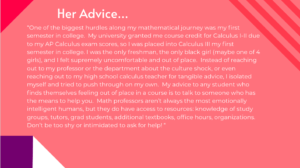“As a group of primarily math teachers, what challenges do you feel you face addressing J.E.D.I in your practice and classes?”
First of all, kudos to @tfaucher for asking the perfect question during Saturday’s Cohort meeting. I think that as math teachers, this is probably something we’ve all been struggling with. Sometimes it feels like certain subjects lend themselves more to this work than others…so how do I make it genuine instead of just feeling like I’m checking off a box? We’ve started a task force at our school to collaborate and brainstorm ways to tackle issues of racism, sexism, and prejudice head on. This is awesome, and I’m happy to be a part of it. However, every time I take a step back and ask myself what I specifically am doing in my classes to tackle this issue, I feel like I don’t have an answer. What am I doing?
Honestly, it’s such a complicated and diverse issue that it can feel overwhelming. At times, I feel that it is easy to be so overcome by the enormity of the issue, that the result is essentially inaction.
Then cue Saturday’s face-to-face. I’ve been enlightened by some of the other math teachers ideas, and am so grateful to learn from them. From the pronouns we are using, to the history of math we are talking about (for example the discovery of Pascal’s triangle – thanks @beaton!), they provided me with some great starting points.
This week, we’ve introduced Mathematician Mondays in my grade nine class. We take a few minutes at the beginning of class every Monday to learn about a different mathematician. We have three main questions we discuss:
1) Who are they and what do they do with math?
2) Why are they inspiring
3) What can we learn from them?
Now, I don’t know if you have ever googled “famous mathematicians”, but a quick search essentially provides you with a stream of primarily white males. Women and people of colour are significantly underrepresented in the math world. I want my students to see all the cool things people are doing with math. I want them to see that there are so many different career paths and hobbies that math can lead to. I want students to see that anyone, regardless of gender, ethnicity, or ability can find success in mathematics. Someone shared a few awesome resources on our Cohort Jamboard outlining mathematicians of colour and women in STEM that I will definitely be using for our mathematician Monday discussions. Does this mean I will never share biographies of white male mathematicians? Of course not. I will however, be striving to expose my students to a diverse group of people, doing diverse things in mathematics. Representation matters.
So here’s our first mathematician.


We then had a class discussion about why Angela is inspiring and what we can learn from her.
Here is what the class came up with:
- She recognizes how difficult it can be to ask for help when you are struggling with math (or ANY class), especially when you feel out of place.
- Nobody wants to feel like they are the only one who doesn’t understand…
- She also recognized that the best way for her to understand was to ask for help, and she reached out to her professors when she needed to. Asking for help is totally okay!
- It’s hard feeling out of place. We should all work together to make sure that everyone feels welcome.
- She now has a pretty awesome job, and is doing what she loves – with MATH!
One thing I will never tire of is being surprised by how insightful a group of 14-year-olds can be. I told them we would be doing this every Monday morning, and they seemed keen. In fact, they asked if they could choose some of the mathematicians. They are now each responsible for creating their own SlideDeck on a mathematician of their choosing who inspires them and that we can learn from. I’m excited to see what they will come up with, and am hoping we end up with a diverse collection of people who inspire our grade 9 mathematicians!
I know this is a minuscule step in my journey to address diversity, equity and inclusion into my practice. But don’t big journeys usually start with small steps? I guess, I’d rather be moving forward than continue to be stationary. So cheers to small steps, and cheers to Mathematician Mondays.
This is awesome! I love so many things about this, one being that it’s reoccurring and not just a one-off, or “checking a box”. I’ve thought of doing something like this but have been hesitant because I don’t know much about mathematicians beyond the Fermats, Euclids, etc.
Thank you for sharing your story, for taking a step forward (no matter how small), and for inspiring others to take a chance, even if it’s out of our comfort zone.
Love this! Beyond the DEI piece that you’re covering here, this is also a wonderful way to provide additional context to what students are learning. I think that I’d have maintained interest in math for longer if I had known about its history and its real-world applications, rather than just been asked to approach it as an abstract series of topics. When I was reading Fritjof Capra and Pier Luigi Luisi’s The Systems View of Life last year (I wrote a blog post about it) there was some fascinating stuff in there about the history of mathematics that I’d have loved to have known when I was taking math courses in school! I’m not sure if you plan to go the historic route with your students or not (current is definitely great context too!) but there are some interesting and diverse contributors to explore even looking back. Glad to hear the students are into this!
Hey Monica, this is such a great addition to your teaching practice! I used those women in STEM posters in my classroom the last couple years–they have opened up some good conversations and serve as daily reminders that STEM is for everyone. Plus, the artwork is so awesome! I think you might really like this resource as well: https://arbitrarilyclose.com/2016/08/21/the-mathematicians-project-mathematicians-are-not-just-white-dudes/
I’ve also found it challenging to wrap my head around bringing JEDI more meaningfully into math learning. Recently, I found some resources that provide social justice lesson plans, or the guides/resources to creating plans. Take a look if you have the chance, it might help alleviate also the anxiety involved in building these types of lessons from scratch.
https://cus.oise.utoronto.ca/Lesson_Plans_Social_Justice_Issues.html#Fair_Trade__Grade_8_
http://www.radicalmath.org/main.php?id=SocialJusticeMath#write
https://sites.google.com/site/mathandsocialjustice/curriculum-resources?fbclid=IwAR1SspcegKyvnPwSzKSJ95FwvUdz95kEoPVxzs5boPfy360Spz8k2S-LqZQ
https://sites.google.com/site/mathandsocialjustice/curriculum-resources?fbclid=IwAR1SspcegKyvnPwSzKSJ95FwvUdz95kEoPVxzs5boPfy360Spz8k2S-LqZQ